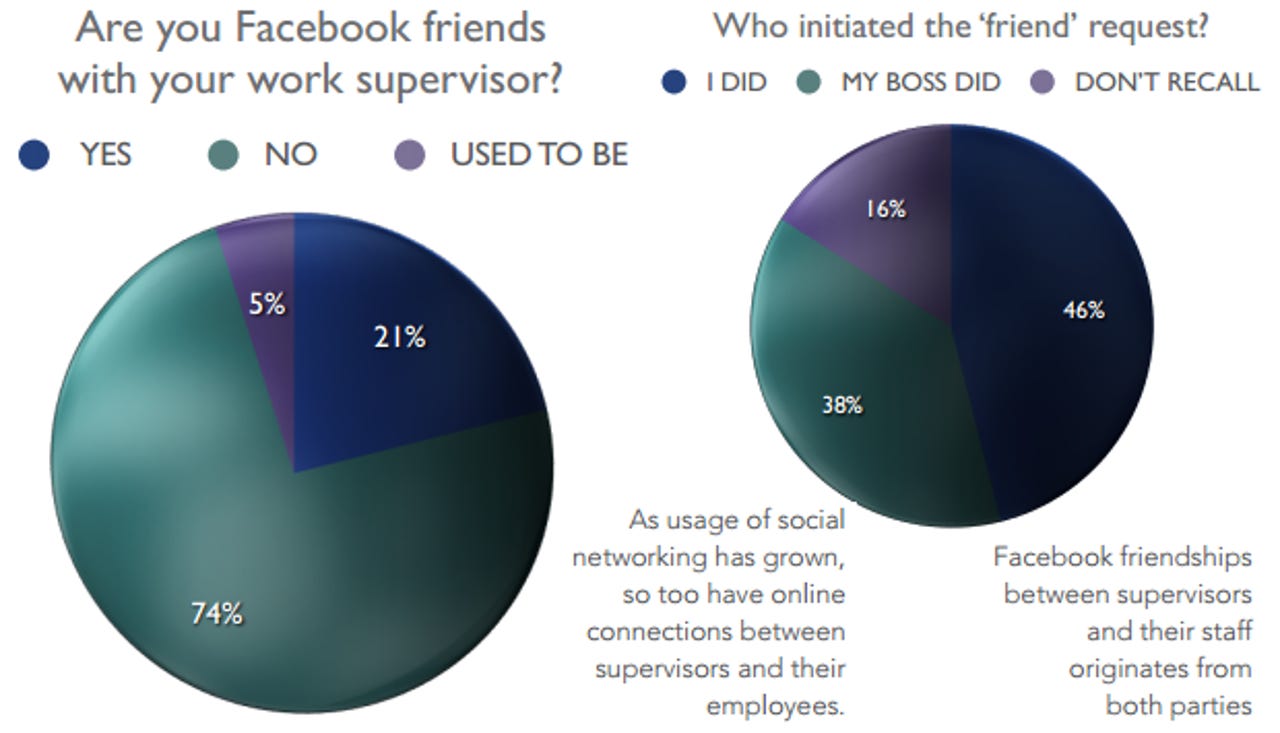21% are Facebook friends with their boss

21 percent of employees – especially those in younger age categories – are friends with their boss on Facebook. Furthermore, men are more likely to believe being Facebook friends with management enables them to do their job more effectively.
The data comes from marketing agency Russell Herder, which surveyed nearly 1,000 U.S. residents in October 2011 to learn how age, gender, and frequency of social networking usage influence attitudes and behaviors towards the decision to connect with one's supervisor online. The result is a nine-page whitepaper, "Making the Connection: How Facebook is Changing the Supervisory Relationship" (PDF), which concludes Facebook has significantly influenced interactions between management and employees, although the online interpersonal dynamics are often uneasy.
The study also found that younger Facebook users are much less likely to believe that it is inappropriate to friend their supervisor on the social network. Of those who have both a Facebook account and a direct supervisor, 26 percent between the age of 18 and 34 report they are connected to their supervisor on Facebook compared to only 10 percent of those 35 and over. Additionally, those who use Facebook the most frequently are more likely to be friends with their supervisor: of those who log into Facebook daily, 23 percent report they are friends with their supervisor on Facebook compared to only 12 percent who log into Facebook less than once per day.
Of all who report being Facebook friends with their supervisor, 46 percent say they initiated the connection whereas 38 percent claim the friend request came from their supervisor. 53 percent of men who reported they are connected to their supervisor on Facebook say they use the social platform to communicate in a professional context compared to only 37 percent of women. 70 percent of Facebook users with an existing connection to their supervisor use it for social purposes.
Almost one-third of men who are friends with their supervisor on Facebook say their connection enables them to do their job at least somewhat more effectively while only 15 percent of women agree this is the case.
As for managers and HR executives, the report offered five suggestions:
- Have a written social media policy: For many organizations, the goals of their social media policy are twofold: to minimize risk by regulating what employees may and may not post via social media, and to improve productivity by regulating social media usage during work hours. Few organizations, however, define what constitutes a personal versus professional online presence for the purpose of regulating the latter to protect and advance company interests.
- Define appropriate boundaries: Managers can only benefit from earnestly exploring the extent to which social interaction benefits and threatens an organization. At a minimum, companies should have mechanisms in place that emphasize merit-based judgments and lessen the influence of social bonds in both employee evaluations and budget allocation. Executive management should seek to define the role that social bonds play in how the organization achieves its business goals and work to create a culture that brings these principles to life.
- Apply standards universally: Policies that govern personal interaction, whether they concern social media or employee fraternization, should apply universally throughout an organization. One of the reasons so many employees feel pressured to engage with their bosses socially, even when they prefer not to, is that they believe the processes by which rewards are distributed, and advancement opportunities are extended, are affected by factors beyond merit. These beliefs are reinforced when standards are not applied equally to all employees. Therefore, it is imperative that any policies governing social interaction apply universally from clerical temp to CEO.
- Don't overreact: The natural response for many leaders in this digital age has been to retreat. Yet, as Russell Herder's survey found, despite significant percentages viewing the connecting of supervisor and subordinate on Facebook as inappropriate, not one individual reported adverse effects on the ability to perform their duties. While the risk of legal liability will vary by industry and should be treated seriously, management should weigh this issue carefully and, in formulating policies, focus on creating a culture that is designed to foster efficient and effective work while mitigating potential risk factors.
- Explore internal social networks: Increasingly, organizations are recognizing their employees’ growing adoption of social media tools and the utility provided. In response, many are investing significant dollars into developing internal social networks. Organizations have been quick to embrace the ability of internal social networks to break down geographical and organizational divisions as well as boost productivity and morale. That said, user adoption is the greatest challenge in managing an organization's internal social networking platform.
Russell Herder CEO Carol Russell says the research insights have implications for all employers. "Social media platforms provide both unique and complicated opportunities in a professional environment," Russell said in a statement. "The research emphasizes the importance of having a written social media policy, defining appropriate boundaries, and applying standards universally to all employees."
See also:
- 56% of employers check applicants' Facebook, LinkedIn, Twitter
- Glassdoor: use your Facebook connections to find a job
- Facebook partners with US government to reduce unemployment
- When Mark Zuckerberg wants to hire you, he takes you to the woods
- Facebook app traffic triples at work (report)
- Facebook is stealing employees from everyone (infographic)
